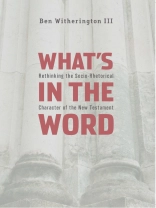Written in clear, and at times colorful, prose, Ben Witherington’s What’s in the Word explains how the recognition of the oral and socio-rhetorical character of the New Testament and its environment necessitates a change in how the New Testament literature is read. Expanding on the work in which he has been fruitfully engaged for over a quarter century, Witherington challenges the previously assured results of historical criticism and demonstrates chapter by chapter how the socio-rhetorical study shifts the paradigm.
Taken together, the chapters in What’s in the Word coalesce around three of Witherington’s ongoing academic concerns: orality and rhetoric; New Testament history, including issues of authenticity and canonicity; and the exegesis of given words in their canonical and socio-cultural contexts. Always unpredictable, this book never fails to pique interest and proffer instruction.
Table des matières
Invitation to the Dance
Chapter One: Oral Examination: How Did ‘Oral’ Texts Function in a Rhetorical Culture?
Chapter Two: Canonical Pseudepigrapha–Is It an Oxymoron?
Chapter Three: Rethinking and Redescribing Scribal Culture
Chapter Four: The Question of Sermons and Homilies in the New Testament
Chapter Five: Rom. 7.7-25- Retelling Adam’s Tale
Chapter Six: What’s in a Name? Rethinking the Historical Figure of the Beloved Disciple in the 4th Gospel
Chapter Seven: What’s in a Word? Part One: Eidolothuton
Chapter Eight: What’s In A Word? Part Two–Porneia
Chapter Nine: What’s in a Phrase?–‘No Male and Female’ (Gal. 3.28)
Chapter Ten: Christianity in the Making’: Oral Mystery or Eyewitness History?
Chapter Eleven: Rethinking the Canonizing of the New Testament
Chapter Twelve: Sign Posts along the Way–On Taking the Less Travelled Path
A propos de l’auteur
Ben Witherington III is Professor of New Testament for Doctoral Studies, Asbury Theological Seminary. His publications include Troubled Waters: Rethinking the Theology of Baptism (2007), Making a Meal of It: Rethinking the Theology of the Lord’s Supper (2007), The Living Word of God: Rethinking the Theology of the Bible (2007), and The Problem with Evangelical Theology: Testing the Exegetical Foundations of Calvinism, Dispensationalism, Wesleyanism, and Pentecostalism, Revised and Expanded Edition (2015).







![Couverture du Brian Schrag & Julisa Rowe: Community Arts for God's Purposes [Chinese] 貼近神心意的社群藝術 Couverture du Brian Schrag & Julisa Rowe: Community Arts for God's Purposes [Chinese] 貼近神心意的社群藝術](https://static.worldofdigitals.com/thumb_webp/740/9781645083740.webp)




